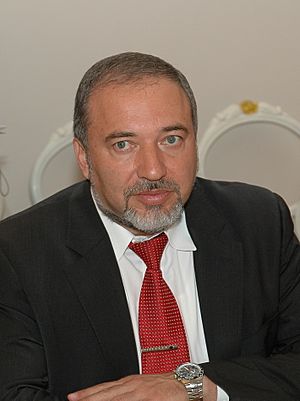Avigdor Lieberman facts for kids
Quick facts for kids
Avigdor Lieberman
|
|
|---|---|
|
אביגדור ליברמן
|
|
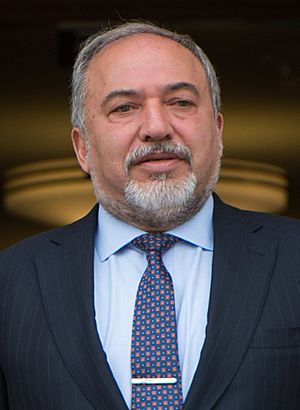
Lieberman in 2017
|
|
| Ministerial roles | |
| 2001–2002 | Minister of National Infrastructure |
| 2003–2004 | Minister of Transportation |
| 2006–2008 | Deputy Prime Minister |
| 2006–2008 | Minister of Strategic Affairs |
| 2009–2012 | Deputy Prime Minister |
| 2009–2012 | Minister of Foreign Affairs |
| 2013–2015 | Minister of Foreign Affairs |
| 2016–2018 | Minister of Defense |
| 2021–2022 | Minister of Finance |
| Faction represented in the Knesset | |
| 1999–2003 | Yisrael Beiteinu |
| 2003–2006 | National Union |
| 2006–2016 | Yisrael Beiteinu |
| 2019–2021 | Yisrael Beiteinu |
| 2022– | Yisrael Beiteinu |
| Personal details | |
| Born |
Evet L'vovich Liberman
(Эвет Львович Либерман) 5 July 1958 Chișinău, Moldavian SSR, Soviet Union |
| Political party | Yisrael Beiteinu (since 1999) |
| Spouse | Ella Tzipkin |
| Children | 3 |
| Residences | Nokdim, West Bank |
| Education | Chișinău Agriculture Institute (no degree) Hebrew University of Jerusalem (BA) |
| Occupation | Politician |
Avigdor Lieberman (born 5 June 1958) is an Israeli politician. He was born in the Soviet Union. He served as Minister of Finance from 2021 to 2022. Before that, he was Deputy Prime Minister of Israel twice. He held this role from 2006 to 2008 and again from 2009 to 2012.
Lieberman moved to Israel with his family in 1978. He became a member of the Knesset (Israel's parliament) in 1999. He has held many important jobs in the government. These include Minister of National Infrastructure and Minister of Transportation. He also served as Minister of Strategic Affairs. He was Minister of Foreign Affairs from 2009 to 2012 and 2013 to 2015. From 2016 to 2018, he was Minister of Defense. He resigned from this role in November 2018.
He is the founder and leader of the Yisrael Beiteinu party. This party's name means "Israel Our Home." It was first popular with Russian-speaking immigrants. Later, it gained support from more people. Lieberman's party has often played a key role in forming Israel's governments.
Lieberman is known for his strong views on the Israeli-Palestinian conflict. He proposed the "Lieberman Plan" in 2004. This plan suggested exchanging land between Israel and the Palestinian Authority. It also included ideas about Arab Israelis and their Israeli citizenship. He has also spoken about military actions.
Contents
Early Life and Education
Evet Lvovich Lieberman was born in Chișinău, which was then part of the Soviet Union. His family spoke Russian and Yiddish. His father was a writer who had faced difficulties under Joseph Stalin's rule. His parents taught him about his Jewish heritage. They also encouraged his love for Russian literature. Lieberman once dreamed of becoming a poet.
After high school, Lieberman studied at the Agricultural State University of Moldova. He focused on how water affects land. He also won an award for a play he wrote.
Lieberman and his family moved to Israel in June 1978. He learned Hebrew and changed his first name to Avigdor. He joined the Israel Defense Forces (IDF). He served in the Artillery Corps and reached the rank of Corporal.
After his military service, he earned a degree from the Hebrew University of Jerusalem. He studied International Relations and Political Science. While at university, he worked at a student club. There, he met his future wife, Ella Tzipkin.
Lieberman and Ella have three children: Michal, Yaakov, and Amos. They live in Nokdim, a community in the West Bank. Lieberman has said he would be willing to move from his home for a peace agreement.
When not in government, Lieberman has worked in business. He imported wood from the former Soviet Union. He speaks several languages, including Russian, Romanian, Hebrew, Yiddish, and English.
Political Career
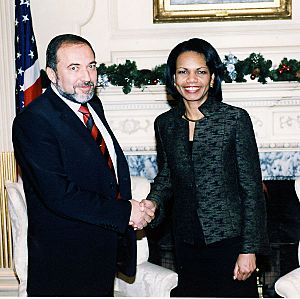
From 1983 to 1988, Lieberman helped create the Zionist Forum for Soviet Jewry. He also worked with the Jerusalem Economic Corporation. In 1988, he began working with Benjamin Netanyahu. He served as Director-General of the Likud party from 1993 to 1996. When Netanyahu became Prime Minister, Lieberman was Director-General of the Prime Minister's Office from 1996 to 1997.
In 1997, Lieberman left Likud. He then formed the Yisrael Beiteinu party in 1999. This party aimed to represent immigrants from the Soviet Union. In the 1999 election, his party won four seats in the Knesset. Lieberman became a member of the Foreign Affairs and Defense Committee.
In March 2001, Lieberman became Minister of National Infrastructure. He resigned from this role in March 2002. In 2003, he was appointed Minister of Transport. He later returned to the Knesset in 2006.
In May 2004, Prime Minister Ariel Sharon removed Lieberman from the cabinet. This was because Lieberman opposed the plan to withdraw from Gaza. Yisrael Beiteinu then left the government.
In the 2006 election, Yisrael Beiteinu won eleven seats. In October 2006, Lieberman joined a new government led by Prime Minister Ehud Olmert. He became Deputy Prime Minister and Minister of Strategic Affairs. This new role focused on threats like Iran's nuclear program. He resigned from the cabinet in January 2008. He disagreed with the peace talks happening at the time.
After the 2009 Israeli elections, Yisrael Beiteinu became the third largest party. In March 2009, it joined the government led by Prime Minister Benjamin Netanyahu. Lieberman was appointed Minister of Foreign Affairs and Deputy Prime Minister.
In October 2012, Lieberman and Benjamin Netanyahu announced that their parties, Likud and Yisrael Beiteinu, would run together in the 2013 elections. Lieberman said this would help stabilize leadership.

As Foreign Minister, Lieberman focused on Israel's foreign policy. He visited many countries and met with other foreign ministers. He worked to strengthen Israel's ties with countries in Africa and Eastern Europe. He also discussed the Iranian nuclear program.
In May 2016, Lieberman became Israel's Minister of Defense. One of his first actions was to ensure equal rights for the families of fallen Lesbian, Gay, Bisexual, and Transgender soldiers.
In 2016, while Defense Minister, Lieberman created a secret document. It warned the Israeli government about a possible attack by Hamas across the Israel-Gaza border. The document predicted that Hamas might try to capture Israeli communities and take hostages. This document was reportedly shown to Prime Minister Benjamin Netanyahu.
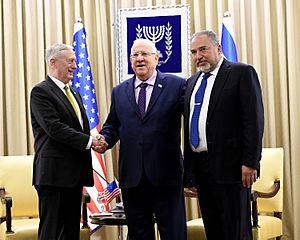
In October 2018, he appointed Maj.-Gen. Aviv Kochavi as the Chief of Staff of the Israel Defense Forces. Lieberman resigned as Defense Minister on November 14, 2018. He did this to protest a ceasefire with Hamas.
Views and Opinions
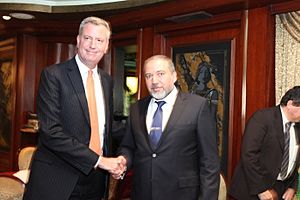
Lieberman believes that the Israeli-Palestinian conflict is complex. He thinks it's not just about land, but also about different ideas. He has said that a Palestinian state based on 1967 borders might not end the conflict.
In May 2004, Lieberman introduced the Lieberman Plan. This plan suggested exchanging land and populations. It proposed that some Arab towns in Israel near Palestinian areas could become part of the Palestinian Authority. Arab Israelis living there would need to pledge loyalty to Israel to remain citizens. Prime Minister Ariel Sharon disagreed with these statements at the time.
After the 2009 Israeli elections, Lieberman said he supported the idea of a Palestinian state. He wrote that he "advocates the creation of a viable Palestinian state." He also said he would agree to leave his home in Nokdim if it led to a two-state solution. He explained that his views had changed over time. He also supported the idea of "responsible citizenship." He compared it to how other countries require loyalty oaths from new citizens.
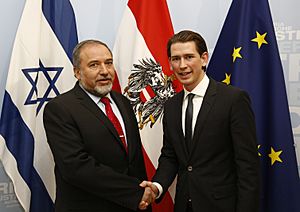
Lieberman supports Israel joining the European Union and NATO. He sees Iran as a serious threat to Israel. He has supported using all means to stop Iran's nuclear program.
His party, Yisrael Beiteinu, is often seen as supporting a secular approach. This means they want to reduce the role of religious courts in government. However, they still support the role of Orthodox religious courts. They want more nationally-minded religious people in charge. They also seek solutions for people who cannot marry under current religious laws.
Lieberman supports expanding foreign relations with Azerbaijan. He notes the historical friendliness of Azerbaijanis towards Jewish people. He believes strengthening ties with Azerbaijan is important.
Media Perception
Many news sources have described Lieberman and his party as right wing or ultra-nationalist. However, people in Israel have different opinions on his politics. A 2014 poll showed that 62% of Israelis saw Lieberman as a national leader.
Yisrael Beiteinu has shown support for a two-state solution. They have also pushed for changes in civil marriage laws and the conversion process. Some experts say these positions are different from traditional right-wing politics in Israel.
Images for kids
See also
 In Spanish: Avigdor Lieberman para niños
In Spanish: Avigdor Lieberman para niños
 | John T. Biggers |
 | Thomas Blackshear |
 | Mark Bradford |
 | Beverly Buchanan |


